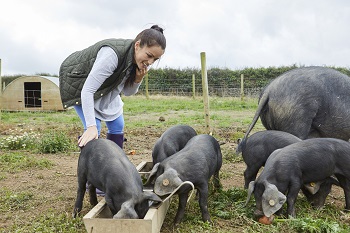5 ways that T Levels prepare learners for apprenticeships
How T Level qualifications bridge the gap between apprenticeships and full-time education.
07 February 2024
Apprenticeships are a viable route into careers in countless sectors and are the chosen option for hundreds of thousands of people every year. But for young people who have just finished their GCSEs, leaving full-time education and entering the workplace as a paid employee is not always something they’re ready for.
This is where T Levels can help learners, providers and employers create the best possible career paths. For 16- to 19-year-olds who don’t yet feel ready for or suited to an apprenticeship, a T Level can be a more gradual introduction to the workplace while also delivering more hours of classroom and workshop-based training, offering an ideal stepping stone between full-time education and an apprenticeship.
1. Industry placements

Every T Level includes a mandatory industry placement of approximately 45 days, giving learners the opportunity to put the skills they’re being trained on into practice in a working environment. By getting to work alongside industry professionals, T Level students can not only improve their sector-specific skills but also start developing the soft skills that can only be picked up in the workplace.
Jack, a T Level learner, felt the placement added something important to the T Level programme: “The Industry Placement has allowed me to take what I have learnt in college into the workplace and improve my skills further. Completing this course has also developed my communication skills and improved my confidence.
The jump from full-time education to the almost full-time employment of an apprenticeship can be challenging for some young people with limited work experience, and a T Level course with an industry placement can help bridge the gap for those who want a more practical education.
2. Developing technical skills
With a range of T Level programmes available across multiple sectors, learners can identify the occupational specialism that suits them and then spend the next two years starting to develop the technical skills they will need for their chosen career. Unlike with A Levels or even other practical qualifications, T Levels can provide expert training in the exact skills that employers are looking for, with course content based on discussions with industry experts.
For young people who are likely to have more general, if any, practical and technical skills relating to their sector, a T Level is one way to start building the breadth of knowledge and skills that they can use as a foundation for further growth with an apprenticeship.
Rory, a T Level student on placement with Vospers Ford highlighted the importance of combining classroom training and the industry placement in developing these skills:
“The placement and the practical lessons within the workshops in college really tie into each other. If there’s something we encountered on placement that we were unsure of or we might not have understood properly, we can feed that back to college, and we might start covering that in the lesson. And some of the things we do at college have prepared us for what we encounter within the workplace.”
3. Understanding expectations

Every industry is different and so are the professional expectations for those working in them. People working in agriculture will have different working approaches and styles to people working in construction, and electricians will have different responsibilities to animal care professionals.
By delivering course content that aligns with real world scenarios and requirements and combining this with an industry placement, T Levels give learners real insight into what working life can be like. This increased understanding of the world of work puts T Level graduates at an advantage, making them more prepared to contribute to a business as part of an apprenticeship.
For young people at the start of their careers this insight is invaluable. Citrina who is completing a Management and Administration T Level with St Francis Xavier Sixth Form College commented:
“I feel like this course is one of the most beneficial courses available in terms of preparing me for my future because you gain actual experience of a working environment and how a business functions.”
4. Gaining familiarity with tools and processes
There are some things that can only be learned through practice. While learning the theory behind key skills and techniques is a necessary part of any training programme, having the opportunity to put that knowledge to the test both in a workshop setting and a real workplace, builds both confidence and competence for learners entering the sector.
By having the chance to attempt new skills or use new tools with supervision and guidance from experts, T Level learners can start to hone their abilities in key areas. For learners this can help boost confidence when it comes to starting their first job role, while employers hiring apprentices who have completed T Levels can feel assured that they will have a level of practical experience to work from.
For Steve Johnson, General Manager at Mercedes Benz Exeter, being able to help learners practice these skills during their industry placement is a big motivator:
“I think there’s too many people with no training, working on all types of cars. And more so now with electric vehicles… We can give them an insight into what the industry is about, and I feel like we do it properly.”
5. Building contacts and relationships
An additional benefit of completing a T Level industry placement is the opportunity to make professional connections within the sector. Young people at the start of their careers can receive invaluable guidance and support from experienced professionals and employers can influence and inspire the next generation, helping to shape their workforce for the future.
For T Level graduates who are ready to apply for an apprenticeship their line manager or supervisor could provide a reference for an application, helping them to stand out amongst other candidates. Many learners also opt to continue with the same company after completing their studies, an idea that appeals to Brandon, a learner on placement with Snows Toyota:
“The idea that I'm most secure with at the moment is doing an apprenticeship with Snows [Toyota]. And then after that either get a job at Snows [Toyota] or use that experience I've had with the industry placement and the apprenticeship to go somewhere else or try and find something else to invest myself into. Because I then would have the skills of having the apprenticeship and the work experience.”
Find out more about T Levels
Read our article looking at how T Levels can help close skills gaps.
Find out more about how T Levels compare to A Levels and apprenticeships.
Ready to get involved? If you are a provider, sign up here for more information on delivering T Levels.